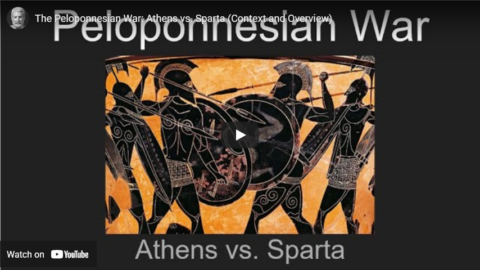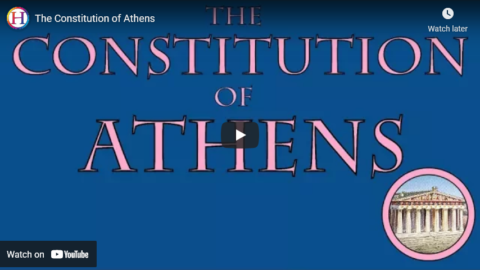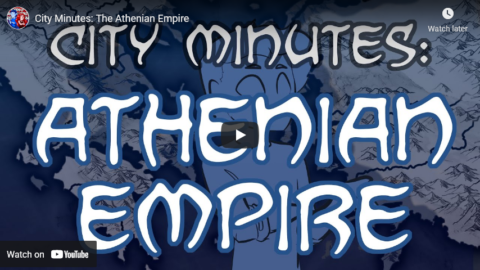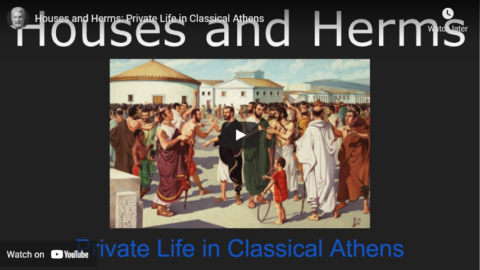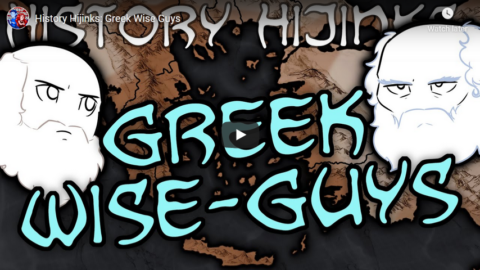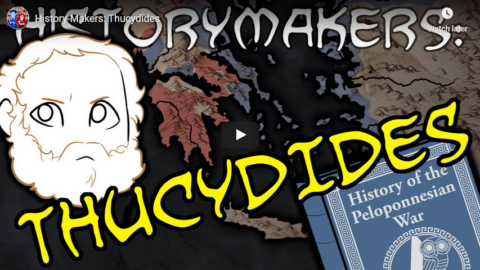Lycurgus was the name the Spartans gave for their mythical founder figure, a Spartan who had supposedly lived in the late 9th century and had set up the Spartan society as we see it in the classical period. Almost all of our details for his life come from a biography by Plutarch, written c. 100 A.D. (date to be significant in a moment). The story the Spartans told went thusly:
Once upon a time … there was a Spartan named Lycurgus, and he was the very best Spartan …
Lycurgus had been the younger brother of one of Sparta’s two kings, but had left Sparta to travel when his brother died, so that he would be no threat to his young nephew.
After a time, the Spartans begged Lycurgus to come back and reorganize society, and Lycurgus – with the blessing of the Oracle at Delphi – radically remade Spartan society into the form it would have for the next 400 years. He did not merely change the government, but legislated every facet of life, from child-rearing to marriage, to the structure of households, the economic structure, everything. Once he had accomplished that, Lycurgus went back to Delphi, but before he left he made all the Spartans promise not to change his laws until he returned. Once the Oracle told him his laws were good, he committed suicide, so that he would never return to Sparta, thus preventing his laws from ever being overturned. So the Spartans never changed Lycurgus’ laws, which had been declared perfect by Apollo himself. Subsequently, the Spartans accorded Lycurgus divine honors, and within Sparta he was worshiped as a god.
And that’s how Lycurgus remade Sparta. The End.
The role Lycurgus serves in the sources is as the perfect, infallible founder figure. No less than the Oracle at Delphi – the divine word of Apollo – declared Lycurgus a god (Hdt. 1.65.3). For later sources who, we must stress – believe their own religion (as people everywhere are wont to do) – that means, essentially a priori that Lycurgus’ “constitution” must be practically flawless and all flaws must stem from its imperfect implementation.
But – wait a second – what is our evidence for the actual person of Lycurgus or the character of the state he set up?
Remember how I said Lycurgus is dated to the late 9th century – specifically the 820s B.C. or so. That’s a huge problem. The earliest Greek literature comes from around (very roughly – there is deep scholarly debate here that I’m glossing over) the mid-8th century (c. 750 or so) and is entirely mythological in nature. The first actual history is Herodotus, writing in the mid-400s. The earliest historical event we have evidence for is the Lelantine War (c. 700ish), at least a century after the life of Lycurgus. None of our sources have anything to go on about Lycurgus – save for what the Spartans – who already worship this figure as a god – tell them. Crucially, Tyrtaeus, writing in the 650s B.C., while he does mention the rhetra (an oracle the Spartans received concerning the arrangement of their government) does not mention Lycurgus (although Plutarch is quick to connect the two, Plut. Lyc. 6.5), meaning that the earliest source for Lycurgus’ existence is Herodotus.
Wait, it gets even better – the one thing we do know about Lycurgus’ laws is that they were not written down (Plut. Lyc. 13.1). Also, Lycurgus supposedly took steps to prevent his remains from returning to Sparta (Plut. Lyc. 29.5-6, but cf. 31.4) and no continued family line, which seems like exactly the sort of explanation you put at the end of a good campfire story for why there was absolutely no trace of such an important man save his legend. So not only the details of Lycrugus’ life, but also the society he created will have lived as oral tradition – potentially changing from one telling to the next, being embellished or expanded – for generations before being committed to the permanent, unchanging memory of written history.
In short, our only evidence for Lycurgus are the campfire stories told about him by people who worshiped him as a god, as related to individuals centuries later. Which is to say that, by historical standards, there is no reliable evidence at all that Lycurgus existed.
[…]
Lycurgus is often set against Solon – the early 6th century Athenian reformer. It is true that Athenians also tend to attribute things to Solon that were later developments, but we need to note the key differences: Solon comes two centuries after Lycurgus (thus, unlike Lycurgus, in the historical period), didn’t receive divine honors and most importantly writes to us (he wrote poetry, some of which survives), so that we can know he was an actual real person. Asking students – as I have seen done – to compare a real, flawed reformer with an idealized, semi-mythical demi-god without any kind of guidance as to the nature of these two figures is, quite frankly, educational malpractice.
Bret Devereaux, “Collections: This. Isn’t. Sparta. Part III: Spartan Women”, A Collection of Unmitigated Pedantry, 2019-08-29.
June 30, 2022
QotD: Sparta had Lycurgus, while Athens had Solon … who at least actually existed
June 10, 2022
Ancient Greek Olives – Gifts from A Goddess
Tasting History with Max Miller
Published 1 Jun 2021Help Support the Channel with Patreon: https://www.patreon.com/tastinghistory
Tasting History Merchandise: crowdmade.com/collections/tastinghistoryFollow Tasting History here:
Instagram: https://www.instagram.com/tastinghist…
Twitter: https://twitter.com/TastingHistory1
Tiktok: TastingHistory
Reddit: r/TastingHistory
Discord: https://discord.gg/d7nbEpyTasting History’s Amazon Wish List: https://amzn.to/3i0mwGt
LINKS TO INGREDIENTS & EQUIPMENT**
Sony Alpha 7C Camera: https://amzn.to/2MQbNTK
Sigma 24-70mm f/2.8 Lens: https://amzn.to/35tjyoW
Dried Rue: https://amzn.to/3yErUqH
Terracotta Bowls with Spoons: https://amzn.to/3wLkEIbLINKS TO SOURCES**
De Agricultura by Cato the Elder: https://amzn.to/3bP20H6
De Re Rustica by Columella: https://amzn.to/3fkN99z
“Defense in the Matter of the Olive Stump” by Lysias
Varro the Agronomist: https://amzn.to/3fkhG7l
Aristotle’s Politics: https://amzn.to/3vkHMNj**Some of the links and other products that appear on this video are from companies which Tasting History will earn an affiliate commission or referral bonus. Each purchase made from these links will help to support this channel with no additional cost to you. The content in this video is accurate as of the posting date. Some of the offers mentioned may no longer be available.
Subtitles: Jose Mendoza
PHOTO CREDITS
Trapitum: Carole Raddato from FRANKFURT, Germany, CC BY-SA 2.0 https://creativecommons.org/licenses/…, via Wikimedia Commons
Akhenaten, Nefertiti and their children: By Neoclassicism Enthusiast – Own work, CC BY-SA 4.0, https://commons.wikimedia.org/w/index…
Amphora with Palm Trees: By Sharon Mollerus – Amphora with Palm Trees, Mycenaean, 15th century BC., CC BY 2.0, https://commons.wikimedia.org/w/index…
Procession fresco from Knossos: By ArchaiOptix – Own work, CC BY-SA 4.0, https://commons.wikimedia.org/w/index…
The Olive tree of Vouves: By Eric Nagle – https://www.reddit.com/r/europe/comme…, CC BY-SA 4.0, https://commons.wikimedia.org/w/index…
Reconstruction of the palace at Knossos: By Mmoyaq – Own work, CC BY-SA 3.0, https://commons.wikimedia.org/w/index…
The soldiers of Xerxes I: By A.Davey – This file has been extracted from another file: Xerxes detail ethnicities.jpg, CC BY 2.0, https://commons.wikimedia.org/w/index…
Lysias: By Coyau / Wikimedia Commons, CC BY-SA 3.0, https://commons.wikimedia.org/w/index…
Bouleuterion: By Zigomar – Own work, CC BY-SA 3.0, https://commons.wikimedia.org/w/index…#tastinghistory #olives #ancientgreece
March 25, 2022
QotD: Herodotus as Spartan propagandist
The greatest military asset the Spartans had was not actual military excellence – although, again, Spartan capabilities seem to have been somewhat better than average – but the perception of military excellence.
Herodotus seems to be at the start of it, at least in our sources – he relates a story where, after an embarrassing failure in an effort to reduce tiny Tegea to helotage (the Tegeans kicked the Spartans’ asses) in the mid-sixth century, the Spartans supposedly stole the bones of the hero Orestes. Consequently, Herodotus notes, the Spartans were from that point on able to always beat Tegea and subdued the Peloponnese (Hdt. 1.68), resulting in the creation of the Spartan-led Peloponnesian League. The unbeatable Spartans thus appear. It’s possible the Spartan reputation predated this, but – as we’ll see – Herodotus will be the one who codifies that reputation and cements it.
Except, hold on a minute – how hard was it to subdue the Peloponnese? It seems to have been done with a fairly adept mix of diplomacy and military force (champion one side in a local dispute, beat the other, force both into your alliance, repeat, see Kennell (2010), 51-3 for details). But it is little surprise that Sparta would be dominant in the Peloponnese. Messenia and Laconia together was around 2,600 square miles or so. This is – if you’ll pardon the expression – flippin’ massive by the standards of Greek poleis. More than twice as large as the next largest polis in all of Greece (Athens). Sparta is fully one-third of the Peloponnese (the peninsula Sparta is located on). The remaining two-thirds is home to many other poleis – Corinth, Argos, Elis, Tegea, Mantinea, Troezen, Sicyon, Lepreum, Aigeira and on and on. Needless to say, Sparta was several times larger than all of them – only Corinth and Argos came even remotely close in size. The population differences seem to have roughly followed land area. Sparta was just much, MUCH larger and more powerful than any nearby state by the start of the fifth century.
Sparta thus spends the back half of the 500s as the teenager beating up all of the little kids in the sandbox and making himself leader. When you are upwards of three times larger (and in some cases, upwards of ten times larger) than your rivals, a reputation for victory should not be hard to achieve. And, in the event, it turns out it wasn’t.
Which brings us back to Herodotus […] because he isn’t just observing the Spartan reputation, Herodotus is manufacturing the Spartan reputation. Herodotus is our main source for early Greek history (read: pre-480) and for the two Persian invasions of Greece. Herodotus’ Histories cover a range of places and topics – Persia, Greece, Scythia, Egypt – and contain a mixture of history, ethnography, mythology and straight up falsehoods. But – as François Hartog famously pointed out in his The Mirror of Herodotus (originally in French as Le Miroir d’Hérodote), Herodotus is writing about Greece, even when he is writing about Persia – those other cultures and places exist to provide contrasts to the things that Herodotus thinks bind all of the fractious and fiercely independent Greek poleis. And he is perfectly willing to manufacture the past to make it fit that vision.
Sparta has a role to play in that narrative: the well-governed polis, a bastion of freedom, ever opposed to tyranny, be it Greek or Persian. We’ll come back to Sparta’s … let’s say relationship … with Persian “tyranny” next week. But for Herodotus, Sparta is the expression of an ideal form of “Greekness” and in Herodotus’ logic, being well-governed (eunomia is the Greek term) results primarily in military excellence. For the story Herodotus is telling to work, Sparta – as one of the leading states resisting Persia – must be well governed and it must be militarily excellent. That’s what will make a good story – and Herodotus never lets the facts get in the way of a good story.
(Sidenote: Athens – at least post-Cleisthenic Athens – gets this treatment too. Athens ends up embodying a different set of “Greek” virtues and where Sparta shows its prowess on land, the Athenians do so at sea.)
And so, Herodotus – the myth-maker – talks up the Spartiates at Thermopylae (you know, the brave 300) and quietly leaves out the other Laconians (who, if you scrutinize his numbers, he knows must be there, to the tune of c. 900 men), downplaying the other Greeks. Spartan leadership is lionized, even when it makes stupid mistakes (Thermopylae, to be clear, was a military disaster and Spartan intransigence nearly loses the battle of Plataea, but Herodotus represents this as boldness in the face of the enemy; even more fantastically inept was the initial Spartan plan to hold on the Isthmus of Corinth as if no one had ever seen a boat before).
Bret Devereaux, “Collections: This. Isn’t. Sparta. Part VI: Spartan Battle”, A Collection of Unmitigated Pedantry, 2019-09-20.
February 11, 2022
The Peloponnesian War: Athens vs. Sparta (Context and Overview)
Thersites the Historian
Published 28 Oct 2021In this lecture, I cover Greek history from 478-404 BCE with an emphasis on the Peloponnesian War. This is intended as a primer on the topic and I devote more time to establishing the context and causes of the war than I do going through the details of conflict itself.
Patreon link: https://www.patreon.com/thersites
PayPal link: paypal.me/thersites
Discord: https://discord.gg/QCaXXFr
Brave Browser: https://brave.com/noa557
Twitter link: https://twitter.com/ThersitesAthens
Minds.com link: https://www.minds.com/ThersitestheHis…
Steemit/dtube link: https://steemit.com/@thersites/feed
BitChute: https://www.bitchute.com/channel/jbyg…
November 30, 2021
The Elgin Marbles
In The Critic, Zachary Hardman outlines the history of the Elgin Marbles and why the Greek government is re-opening the campaign to retrieve them from the British Museum:
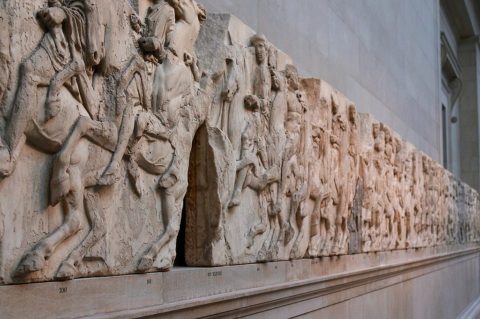
Some of the sculptures in the Elgin Marbles collection on display in the Duveen Gallery of the British Museum.
Photo by Paul Hudson via Wikimedia Commons.
Last week, the Greek Prime Minister, Kyriakos Mitsotakis was in London, with only one thing on his mind: the return of the so-called “Elgin Marbles” to Athens. 2021 is the two-hundredth anniversary of Greek independence, when the country liberated itself from the yoke of the Ottoman Empire and, for Athens, there would be no better birthday present than the restitution of the lost marbles.
The dispute about their rightful ownership is as old as the modern Greek state. In the early 19th century, the British Ambassador Lord Elgin was granted permission by Athens’ Ottoman rulers to remove half the remaining marble sculptures from a frieze on the Parthenon, the ruined ancient temple, which still adorns the Acropolis, the rocky outcrop overlooking the city.
Elgin had the marbles shipped to Britain. The journey, though, proved difficult. They were transported via Malta where, following a shipwreck, they spent a brief sojourn at the bottom of the Mediterranean Sea. The rescue mission was ruinously expensive. Elgin intended to furnish his ancestral Scottish home with the marbles. On second thoughts, though, he cut his losses and sold them to the British Museum.
Public opinion was divided. Lord Byron wrote two poems denouncing Elgin. His supporters, meanwhile, claimed the marbles were saved from further damage at the hands of warring Greeks and Turks, who didn’t appreciate them anyway. The Greeks, understandably, took a dim view of this. Since the 1980s they have waged a sustained PR offensive for the return of the marbles. An impasse, though, remains.
To break it, Mitsotakis would do well to consider the insights of the ancient rhetoricians. Athens, of course, was the birthplace of not only democracy, but rhetoric: the art of persuasion. The philosopher Aristotle, who wrote the original guidebook on the subject, said it was about identifying “the means of persuasion in any given case”. It is the task of modern Athens to work out who it must persuade and what of.
The fresh campaign began with the Government. In Downing Street, after all, lives a man Mitsotakis regards a “true philhellene”. The return of the marbles, the Greek Prime Minister said, after a meeting with Johnson, would be a “coup” for “global Britannia”. Flattery, however, has its limits. The British Government is unwavering in its support for the Museum. Mitsotakis, however, was undeterred.
October 26, 2021
The Constitution of Athens
Historia Civilis
Published 15 Dec 2017Patreon | http://historiacivilis.com/patreon
Donate | http://historiacivilis.com/donate
Merch | http://historiacivilis.com/merch
Mailing List | http://historiacivilis.com/mailinglist
Twitter | http://historiacivilis.com/twitter
Website | http://historiacivilis.comSources:
The Athenian Constitution by Aristotle: http://amzn.to/2C1mHLv
Politics by Aristotle: http://amzn.to/2AB6KPV
Parallel Lives: The Life of Solon by Plutarch: http://amzn.to/2AT5Viv
The Constitution of the Athenians by Pseudo-Xenophon: http://amzn.to/2z9rE6l
The Rise of Athens by Anthony Everitt: http://amzn.to/2C2ryMu
The Athenian Democracy in the Age of Demosthenes by Mogens Herman Hansen: http://amzn.to/2AEAtYj
Persian Fire by Tom Holland: http://amzn.to/2AjLB8WMusic:
“Direct to Video,” by Chris Zabriskie
“It’s Always Too Late to Start Over,” by Chris Zabriskie
“Mario Bava Sleeps In a Little Later Than He Expected To,” by Chris Zabriskie
“Hallon,” by Christian BjoerklundWe are a participant in the Amazon Services LLC Associates Program, an affiliate advertising program designed to provide a means for us to earn fees by linking to Amazon.com and affiliated sites.
October 11, 2021
City Minutes: The Athenian Empire
Overly Sarcastic Productions
Published 25 Jun 2021Deja Vu? Only slightly! I’m re-imaging City Minutes, and this time the plan is to *Actually Make It Good*! With MULTIPLE CITIES per episode, and HORIZONTAL VIDEO!
I heard your feedback on the first run of the shorts loud and clear — City Minutes Good, Shorts Bad — so this will be the format going forward: networks of cities, with each getting a minute of spotlight.
We’re starting where I always start, in ancient Athens (I wanted to give you the proper version of the pilot), but we’ve got tons of other City Minutes planned!
SOURCES & Further Reading: Thucydides History of the Peloponnesian War, World History Encyclopedia (https://www.worldhistory.org/Athens): “Athens”, “Piraeus”, “Sounion”, “Delos”, “Corcyra”, “The Delian League” parts 3 & 4, and my degree in Classical Studies
Cities by timestamp:
00:00 — Athens
1:00 — Piraeus
2:01 — Sounion
3:03 — Delos
4:05 — Mytilene
5:03 — Korkyra
6:03 — ConclusionOur content is intended for teenage audiences and up.
PATREON: https://www.Patreon.com/OSP
PODCAST: https://overlysarcasticpodcast.transi…
DISCORD: https://discord.gg/osp
MERCH LINKS: http://rdbl.co/osp
OUR WEBSITE: https://www.OverlySarcasticProductions.com
Find us on Twitter https://www.Twitter.com/OSPYouTube
Find us on Reddit https://www.Reddit.com/r/OSP/
From the comments:
Overly Sarcastic Productions
43 minutes ago
Fun linguistic shenanigans: The island of Korkyra (commonly spelled Corcyra when referring to the ancient city) is known today as both Kerkyra and Corfu. The name Corfu comes from an Italianized version of the Byzantine name Korufo.I use the pronunciation of “Korkyra” with an O because it reflects the more common version of the name as listed in ancient accounts — adherence to the original ancient version is also why I’m using Ks in place of any Latinized Cs.
Essentially: I’m spelling everything the ancient way, but using modern Greek phonetics to sound out those words. It’s an uncommon way to go about, but it feels like the right balance of ancient authenticity and modern linguistic continuity.
-B
October 7, 2021
Houses and Herms: Private Life in Classical Athens
Thersites the Historian
Published 6 Oct 2021In this video, I look private life in classical Athens with a focus on material culture.
Patreon link: https://www.patreon.com/thersites
PayPal link: paypal.me/thersites
Discord: https://discord.gg/QCaXXFr
Brave Browser: https://brave.com/noa557
Twitter link: https://twitter.com/ThersitesAthens
Minds.com link: https://www.minds.com/ThersitestheHis…
Steemit/dtube link: https://steemit.com/@thersites/feed
BitChute: https://www.bitchute.com/channel/jbyg…
July 10, 2021
History-Makers: Aristophanes
Overly Sarcastic Productions
Published 9 Jul 2021He told the Athenians they were a disaster and they gave him a prize. Aristophanes wrote in the new Theatrical genre of Comedy during the golden age of Athens, and used his plays to viciously satirize Athenian society. They create a fabulously clear portrait of ancient Athenian life, and they have the corollary benefit of being funny as hell.
SOURCES & Further Reading: The 11 plays of Aristophanes, with particular focus on Clouds and Women at the Thesmophoria, Britannica’s “Aristophanes”, Crash Course Theater #2 & 4.
Partial Tracklist: “Sneaky Snitch”, “Marty Gots A Plan” Kevin MacLeod (incompetech.com)
Licensed under Creative Commons: By Attribution 4.0 License
http://creativecommons.org/licenses/b…Our content is intended for teenage audiences and up.
PATREON: https://www.Patreon.com/OSP
PODCAST: https://overlysarcasticpodcast.transi…
DISCORD: https://discord.gg/osp
MERCH LINKS: http://rdbl.co/osp
OUR WEBSITE: https://www.OverlySarcasticProductions.com
Find us on Twitter https://www.Twitter.com/OSPYouTube
Find us on Reddit https://www.Reddit.com/r/OSP/
From the comments:
Overly Sarcastic Productions
2 hours ago
While we’re here, one subject I cut for time is the relationship between “The Clouds” and the trial of Socrates.It’s commonly assumed that Aristophanes’ satire played a part in Athens’ decision to charge and ultimately kill Socrates, but that interpretation doesn’t really hold up to scrutiny.
The Clouds was performed over 20 years before Socrates’ trial. If the play had that strong an effect on Athens, we can assume Socrates would have been charged far sooner. And Plato’s own writings paint Aristophanes rather favorably — if Plato blamed Aristophanes for the trial, he does not make that obvious.
There IS one snide line in Socrates’ Apology that seems to a modern reader like it’s referring to The Clouds, but really we can’t be sure. Aristophanes was not the only comic playwright in Athens, and certainly not the only person who disliked Socrates. Did The Clouds contribute to a negative public perception of Socrates? Sure, in part, at least when it was performed in 423. But it’s faaar more likely that Socrates’ trial and death in 399 owe more to his persistent habit of being a Colossal Pain In The Ass to whomever he was speaking with.
Reading The Apology makes it clear that nobody had the power to make Athens hate Socrates more than Socrates.
-B
June 22, 2021
History Summarized: The Athenian Temple at Sounio
Overly Sarcastic Productions
Published 29 Sep 2017On my summer vacation, I had the distinct pleasure of visiting Cape Sounio, at the southern tip of Attica at sunset, and I have to say it was one of the most historically exciting moments of my life. For all I myself have said about the Athenian empire, seeing the view from this temple made everything click into place and feel tangibly real for the first time ever (even my 10+ trips to the Parthenon over the course of my childhood didn’t do that). So uh … here’s 7 minutes of me gushing about it under the thin guise of persuasive historical argumentation.
PATREON: www.patreon.com/user?u=4664797
MERCH LINKS:
Shirts – https://overlysarcasticproducts.threa…
All the other stuff – http://www.cafepress.com/OverlySarcas…Find us on Twitter @OSPYouTube!
June 4, 2021
The Peloponnesian War
Epimetheus
Published 21 Oct 2018The Peloponnesian War (extended Video)
Support new videos from Epimetheus on Patreon!
https://www.patreon.com/Epimetheus1776
From the comments:
Epimetheus
2 years ago (edited)
On Spartan society I left out the council of five ephors who were elected annually and shared power with the two kings. This video is a little less edited and recorded partially earlier this year and this evening — sorry if the audio sounds a little all over the place — but I thought some of you may enjoy a finished video rather than one that does not get released — let me know what you think of this longer less polished style of video in contrast to the shorter version of this videoI have increasingly committed to using most of my time on this channel writing researching editing drawing and narrating these videos by myself, I love doing it and would not like to go back to working full time in a cubicle (doing boring stuff) if you want to help me out with upgrading my software and equipment (I use a slow old computer and a tablet) you can do so on Patreon https://www.patreon.com/Epimetheus1776
Even if it is just a single dollar I greatly appreciate you taking the time and your generosity
October 24, 2020
Andrew Sullivan on the potentials of therapeutic use of psilocybin
In the last free edition of his Weekly Dish newsletter — and probably the last time I’ll be able to link to it — Andrew Sullivan discusses the medical trials and legalization initiatives for psilocybin along with some of the history of its use in the Elusinian Mysteries in ancient Greece:
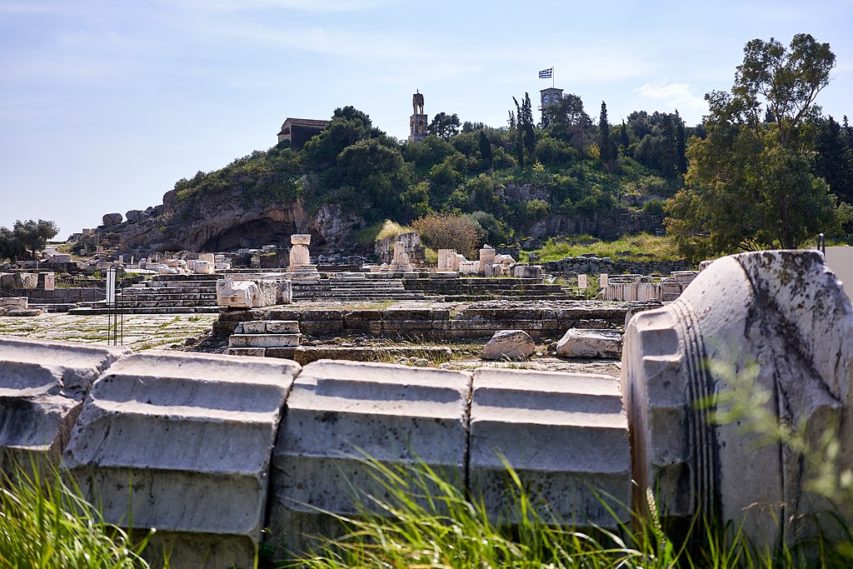
At the archaeological site of the Sanctuary of Demeter at Eleusis. The information board on the left stands on what was once the courtyard of the sanctuary. Over the staircase behind it stood the Greater Propylaea. Next to the cavern in the background stood the Sanctuary of Pluto (who abducted Persephone, Demeter’s daughter). The cavern represents the entrance to the Underworld. The path to the left of the cavern leads to the Telesterion where the faithful were initiated to the Eleusinian mysteries. The brown building up on the hill (left) is a church dedicated to the Virgin Mary (Church of Panagitsa Mesosporitissa) and stands over the area of the Telesterion.
Photo by George E. Koronaios via Wikimedia Commons.
There are many ways in which this election might portend the future, but there’s a seemingly small issue — only on the ballot in Oregon and the District of Columbia — that’s a sleeper, it seems to me, and worth keeping an eye on. It’s the decriminalization of naturally-occurring psychedelics, in particular, psilocybin, the psychoactive ingredient in some mushrooms which have long been dubbed “magic.”
This doesn’t come out of the blue. Huge strides have been taken in the last few years in the decriminalization of cannabis, with 33 states allowing medical use, of which 11 allow recreational as well. The FDA recently greenlit clinical trials for psilocybin as a “breakthrough therapy” for depression — with some wildly impressive results. Books like Michael Pollan’s magisterial How To Change Your Mind have helped shift the reputation of psychedelics from groovy, counter-cultural weirdness to mature, spiritual, and regulated mental health treatment. Ketamine — previously a party drug and an animal tranquilizer — has shown more promise as an anti-depressant than any therapy since the mid-1990s.
The familiar worry, of course, is that we might be ushering in an era of wild drug experimentation, with unforeseen and unknowable results. Some people fear that relaxing some of the legal restrictions on things that grow in nature could lead to social disruption or higher levels of addiction or worse. The great popularizer of psychedelics, Aldous Huxley, gave us a somewhat sobering description of what might be our future in Brave New World, and many in the West have been terrified of these substances for quite a while.
But new research suggests that this shift toward integrating psychedelics into a healthy, responsible life for Westerners may not be new at all. It would, in fact, be a return to a civilization that used these substances as a bulwark of social and personal peace. New literary investigations of ancient texts, new — and re-examined — archeological finds, and cutting edge bio-chemical technology that can detect and identify substances in long-buried artifacts, suggest that deploying psychedelics would, in fact, be a return to a Brave Old World we are only now rediscovering.
We’ve long known that human knowledge of psychedelic aspects of nature goes back into pre-history; and use of them just as far. But perhaps the most surprising find in this new area of research is that sacred tripping was not simply a function of prehistoric religious rituals and shamanism, but an integral, even central part, of the world of the ancient Greeks. The society that remains the basis for so much of Western civilization seems to have held psychedelics as critical to its vision of human flourishing. And that vision may have a role to play in bringing Western civilization back into balance.
A breakthrough in understanding this comes in the form of a rigorously scholarly new book, The Immortality Key: The Secret History of the Religion With No Name, by Brian Muraresku. What he shows is the centrality of psychedelic use for the ancient Greeks, in an elaborate and mysterious once-in-a-lifetime ceremony at the Temple of Eleusis, a short distance from Athens. We’ve long known about this temple of the Mysteries, as they were known, and the rite of passage they offered — because it’s everywhere in the record. Many leading Greeks and Romans went there, including Plato and Marcus Aurelius. Here is Cicero, no less, in De Legibus:
For it appears to me that among the many exceptional and divine things your Athens has produced and contributed to human life, nothing is better than those Mysteries. For by means of them we have been transformed from a rough and savage way of life to the state of humanity, and been civilized. Just as they are called initiations, so in actual fact we have learned from them the fundamentals of life, and have grasped the basis not only for living with joy, but also for dying with a better hope.
October 17, 2020
History Hijinks: Greek Wise Guys
Overly Sarcastic Productions
Published 16 Oct 2020When I first studied Ancient Philosophy in college I thought it was engaging and interesting to discuss and whatever, but only years later did I come to appreciate the true hilarity of these Wise-Guys.
SOURCES & Further Reading: Plato’s Dialogues (Apology & Republic), Aristotle’s Ethics, Gorgias’ Encomium of Helen, and when direct sources aren’t available, there’s a bucketload of great write-ups from Stanford: https://plato.stanford.edu/entries/pr…, https://plato.stanford.edu/entries/de…, https://plato.stanford.edu/entries/ar…, https://plato.stanford.edu/entries/pl…, https://plato.stanford.edu/entries/so…
This video was edited by Sophia Ricciardi AKA “Indigo”. https://www.sophiakricci.com/
Our content is intended for teenage audiences and up.
PATREON: https://www.Patreon.com/OSP
PODCAST: https://overlysarcasticpodcast.transi…
DISCORD: https://discord.gg/kguuvvq
MERCH LINKS: http://rdbl.co/osp
OUR WEBSITE: https://www.OverlySarcasticProductions.com
Find us on Twitter https://www.Twitter.com/OSPYouTube
Find us on Reddit https://www.Reddit.com/r/OSP/
September 28, 2020
The Elgin Marbles as oversized bargaining chips
Michael Curtis on the renewed demands that the British government return the Elgin Marbles to Athens:
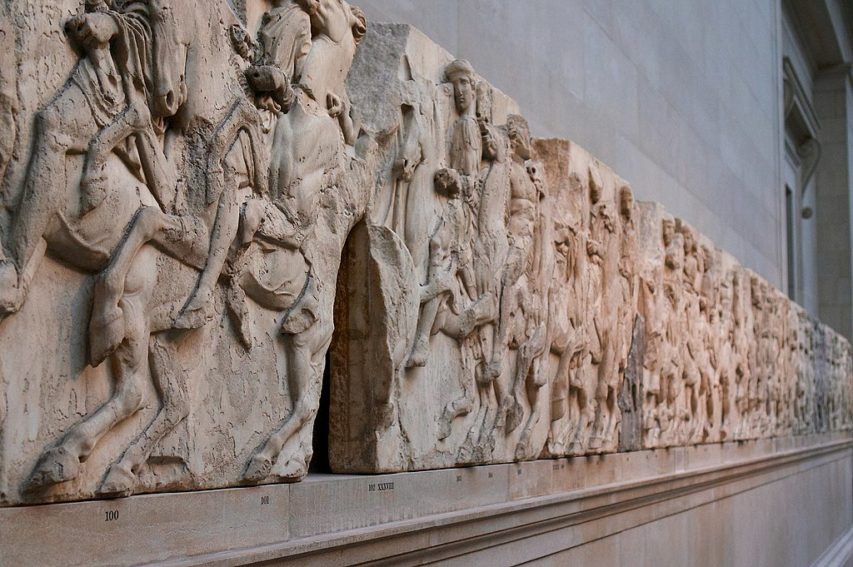
Some of the sculptures in the Elgin Marbles collection on display in the Duveen Gallery of the British Museum.
Photo by Paul Hudson via Wikimedia Commons.
The internecine wars in Washington, D.C., continue over government funding, a coronavirus relief bill, government shutdown, but on September 9, 2020 one form of political truce between Republicans and Democrats on foreign affairs was announced. Eighteen members of the U.S. Congress, bilateral members of the Congressional Caucus on Hellenic issues, including the chairs of the House Oversight and Rules committees, and Foreign Affairs subcommittee on issues relating to Europe, had written a letter to British Prime Minister Boris Johnson.
It informed him, in case he didn’t know, that the Elgin marbles, EM, had been the source of controversy among allies for many decades. The letter urged the British government, already saddled by labyrinth Brexit discussions, to negotiate with the Greek government in earnest over the return of the Elgin marbles to Greece by 2021, the 200th anniversary of the modern Greek nation. The eighteen Congress people joined other Americans intruding in British affairs. On September 16, 2020 both Joe Biden and Nancy Pelosi said there can be no US-UK trade deal if Brexit negotiations undermined the 1998 Good Friday peace agreement. However, the letter of the Congress group has raised the problem of the restitution of cultural objects taken from their country of origin.
Prime Minister Johnson does not need reminding that it was Thomas Bruce, Earl Elgin, British Ambassador to the Ottoman Empire, which included Greece, who took the marbles from the Parthenon in Athens, 1801-1805. The Parthenon, the central building of the Acropolis of Athens. was built around 488 B.C. to honor a goddess called Athena, and was at different times a Christian church and a mosque. The pillars and sculptures of the Parthenon were made of marble.
Elgin, with a passion for classical antiquities, made the case that the art works in the temples of Greece, then under Ottoman control would be destroyed because of Turkish indifference. Some had been destroyed in 1687 when the Venetians attacked Athens. The Sublime Porte granted Elgin’s request to take away pieces of stone with old inscriptions or figures. Perhaps this was gratitude for British action in blocking the advance of Napoleon in Egypt. Elgin took pediment sculptur friezes, metopes, and fragmented pieces from the walls of the Parthenon, and brought them to Britain. In 1816 he sold the sculptures to the British government which then sent them to the British Museum where they have remained.
Though the letter by the 18 members of Congress might be considered impertinent, it contained no threat of any kind but attempted to spark action on a disputed issue which has emotional appeal and symbolic importance, the presence of the Elgin marbles in the British Museum. In recent years the issue has been raised by officials of the European Union as well as by celebrated private citizens such as the actor George Clooney and his wife, and co-stars Bill Murray and Matt Damon, who while working on the 2014 film The Monuments Men, about art stolen by the Nazis, thought return of the Elgin marbles to Greece was the “right thing” to do.
August 22, 2020
History-Makers: Thucydides
Overly Sarcastic Productions
Published 21 Aug 2020Start your free trial at http://squarespace.com/overlysarcastic and use code
OVERLYSARCASTICto get 10% off your first purchase.Ahh ancient Greece, it has been entirely too long. Today we’ll take a look at the foundational work of my entire career path — Thucydides’ History of the Peloponnesian War, a book that almost single-handedly set the standard for how we engage in historical inquiry. Also it has the added benefit of being about Ancient Greece so win-win!
SOURCES & Further Reading: History of the Peloponnesian War by Thucydides, Histories by Herodotus, Hellenica by Xenophon, and the 4 straight years I spent studying this in university — Boy do I love doing a video about a topic I’m specifically trained in.
This video was edited by Sophia Ricciardi AKA “Indigo”. https://www.sophiakricci.com/
Our content is intended for teenage audiences and up.PATREON: https://www.Patreon.com/OSP
DISCORD: https://discord.gg/kguuvvq
MERCH LINKS: https://www.redbubble.com/people/OSPY…
OUR WEBSITE: https://www.OverlySarcasticProductions.com
Find us on Twitter https://www.Twitter.com/OSPYouTube
Find us on Reddit https://www.Reddit.com/r/OSP/


